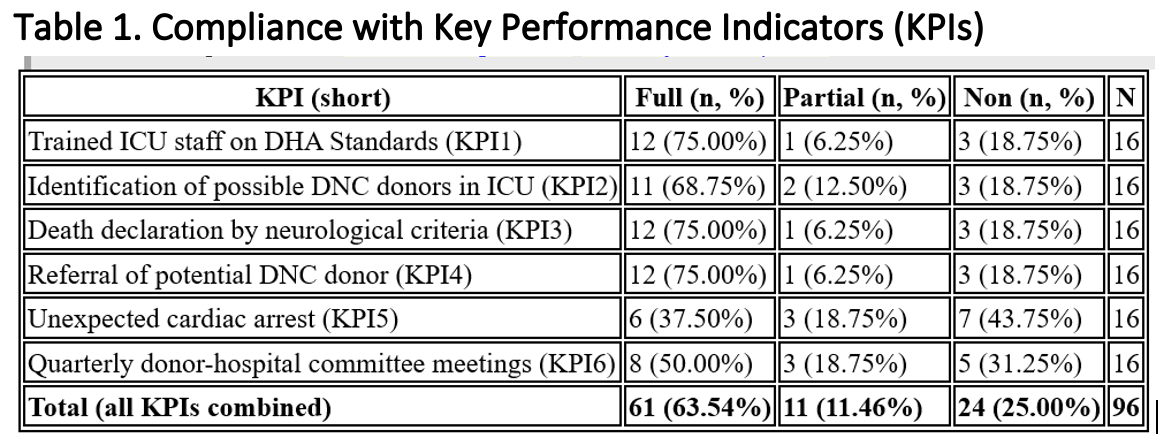Evaluation of high-potential donor hospitals in Dubai: Compliance with DHA organ donation standards and key performance indicators
Ayesha Al Falahi1, Hanan Obaid2, Rupali Bindra3, Maria Gomez4, Tanvi Agarwal5, Hisham Aboualloul6.
1Health Policies and Standards Department, Dubai Health Authority, Dubai, United Arab Emirates; 2Director of Health Policies and Standards Department, Dubai Health Authority, Dubai , United Arab Emirates; 3Senior Clinical Auditor, Dubai Health Authority, Dubai, United Arab Emirates; 4Director of The National Center for Organ Donation and Transplant Department, National Center- Ministry of Health and prevention, Dubai, United Arab Emirates; 5Quality Health Assurance Program Specialist, National Center- Ministry of Health and prevention, Dubai, United Arab Emirates; 6Management Consultant, National Center- Ministry of Health and prevention, Dubai, United Arab Emirates
Introduction/Background: Organ transplantation (OT) offers lifesaving treatment to patients on waiting lists for transplantation. The strategies used by Dubai Health Authority (DHA) as the standards and policy’s it’s to ensure quality, safety, and ethical compliance, and plays a pivotal role enhancing organ donation (OD) process mainly for early donor identification, referral, evaluation, and death determination in the very high-potential donor hospitals
Objectives: Improving the OD process effectiveness and quality by establishing the standards and policies and the KPIs, DHA standards and policies ensure that the OD process is moving forward according to national and local health authorities’ directives, provides strategic guidance to achieve KPIs targets and provides recommendations to streamline the OD process for successful outcome.
Methods: DHA Standards and Key Performance Indicators was established in (2023). A structured evaluation framework was applied to the identified busiest trauma hospitals (16 high-potential donor hospitals) in Dubai. Each hospital was assessed against 31 DHA criteria and 6 KPIs. Compliance was categorized as full, partial, or non-compliance. One of the main committee actions was the in-hospital seminars to achieve the target of at least 70% of the HCW trained in organ donation.
Results: The findings revealed considerable variability across facilities. High compliance was noted in documentation and reporting standards: 100% of hospitals fulfilled the requirement for complete assessment forms (criteria 22), and all hospitals complied with criteria 30 and 31. Strong governance structures were also evident, with 93.8% compliance for morbidity and mortality committees (criterion 10). In contrast, major deficiencies were seen in organ and tissue retrieval (criterion 7) and organ packaging and transportation (criterion 8), where only 12.5% of facilities were compliant. Communication and training standards also showed weaknesses: only 25% of facilities met breaking bad news protocol (criterion 25), and <20% ensured full communication training for ICU staff (criterion 29). KPI analysis demonstrated strengths in ICU staff training (75% compliance) and referral of potential donors (75%), but critical weaknesses in unexpected cardiac arrest management (37.5%) and regular donor hospital committee meetings (50%). The successful implementation of DHA standards and key performance indicators (KPIs) has contributed to a marked increase in organ donation activity in Dubai, with the number of donors rising from 20 in 2022 to 60 in 2024. At present, Dubai accounts for approximately 50% of the total organ donors in the United Arab Emirates, underscoring the impact of structured governance and performance monitoring on donor program growth. KPI’s Compliance is shown in Table 1
Conclusion: Implementation of DHA’s standards and the KPIs within 16 high-potential donor hospitals contributed to raising the knowledge rate and the number of cases of acceptance of organ donation by families. The success of organ donation within hospitals depends entirely on measuring the extent of knowledge of medical personnel about organ donation. It has been confirmed that the presence of the standards and policies and the KPIs in Dubai within the hospital for organ donation that works on training is clear progress in increasing the number of cases of donors and family consenters, and it is the first active example in one of the largest and busiest trauma hospitals in the Emirates.
